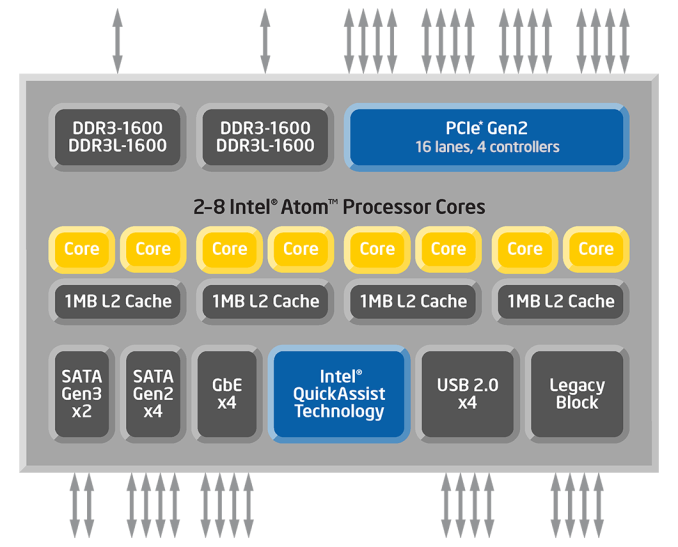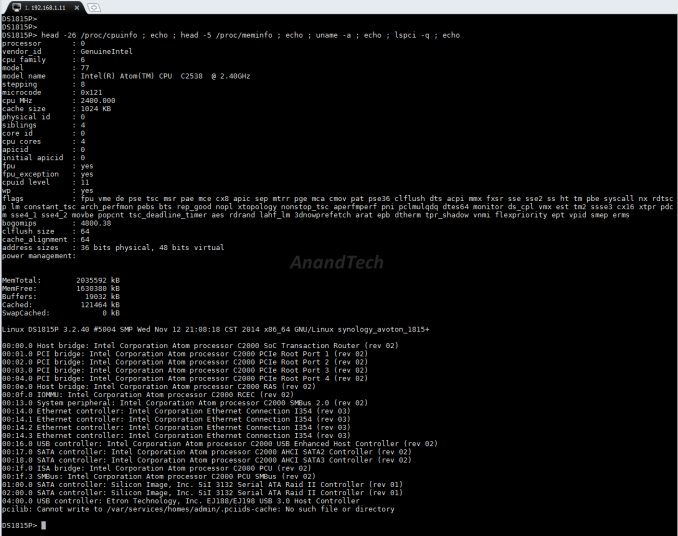Synology DS1815+ 8-bay Intel Rangeley SMB NAS Review
by Ganesh T S on November 18, 2014 6:30 AM ESTPlatform Analysis
The higher end segment of the SOHO / SMB NAS market uses Intel's Core-series and Xeon CPUs to deliver the required performance while supporting a large number of drive bays (typically more than 8, in a rackmount form-factor). Over the last four years or so, Intel's play in the other tiers has been mainly with its Atom CPU lineup. Back in 2010, Intel pushed the 45 nm Atom D410 / D510 / D525 for NAS units. In 2012, it was the 32 nm Atoms, the D2550 and D2700. All of these were based on the in-order Bonnell microarchitecture which was fast becoming dated compared to the advancements being made by the ARM SoC vendors. In moving from 32nm to 22nm, Intel completely revamped the microarchitecture for their Atom cores. Bonnell was replaced by Silvermont, bringing out of order execution and other improvements into the picture. Silvermont's applicability to a variety of power profiles meant that there were multiple product lines that ended up using the CPU cores. Bay Trail is proving very effective in tablets and also makes up QNAP's TS-x51 and TS-x53 Pro NAS series. Merrifield and Moorefield are trying to break into smartphones, but it is Avoton and Rangeley that are more relevant to the storage appliances market.
The different product lines integrate different I/O around the Silvermont cores depending on the target market. Avoton is meant for microservers and cloud storage platforms, while Rangeley is meant for communication and network infrastructure. Both of them integrate similar I/O around the cores, but the Rangeley parts have an updated crypto engine. The block diagram of a generic Rangeley part is provided below.
There is a wealth of I/O (2x SATA Gen 3, 4x SATA Gen 2 and up to 16 PCIe 2.0 lanes) for the storage subsystem, and the parts also support up to 4x 2.5 Gbps network links. From the viewpoint of the Synology DS1815+, the above block diagram should be considered in the context of the information gleaned via SSH access to the unit.
The DS1815+ uses the Intel Atom C2538 SoC which has four Silvermont cores running at 2.4 GHz. It is backed up by 2 GB of DRAM. The Atom C2538 has 16 PCIe 2.0 lanes. The Silicon Image SiI3132 PCIe to 2-port SATA II host controller uses a single PCIe 2.0 lane on the host side. There are two of them using up two PCIe 2.0 lanes in total. Unlike the DS415+ in which the USB 3.0 ports were provided by the Etron EJ168 USB 3.0 host controller, the DS1815+ uses the Etron EJ198. This USB 3.0 host controller uses two PCIe lanes to enable the four USB 3.0 ports found on the rear side of the unit. The four Ethernet controllers are all based on the Intel I354. Despite being 2.5G-capable, the transceivers they are connected to make them GbE ports.
The more interesting hardware aspect is the absence of any PCIe to SATA bridges for the internal ports. Given that the C2538 has only a total of six SATA ports (2x SATA III and 4x SATA II) and there are no bridges in the SSH report, it can be inferred that a port multipler (1x SATA host to 2x SATA device) such as the ASMedia ASM1092 must be in use. However, without opening up the unit (which we haven't done yet, given our limited time to bring out the review), this can't be confirmed.
On the software front, the DS1815+ runs Linux (kernel version 3.2.40). We have covered DSM 5.0's setup and usage impressions in our recent DS214play and DS414j reviews. There is not much point in rehashing the same excellent setup and usage experience. That said, with the ioSafe 1513+, we also started looking at iSCSI support in NAS units. We will be looking at that aspect in this review also.












65 Comments
View All Comments
stevenrix - Thursday, November 20, 2014 - link
I actually own the DS1812+. I was going to build my own NAS but I wanted a hardware solution for the RAID, because software RAID is just too slow. Then I could not find the right type of tower I wanted for the drives, that was another issue, then I was not able to expand the RAID on the fly if I wanted to add more drives or even build a dynamic partition, so I decided to go with that solution instead. I haven't got one single problem with my unit that just reached 1 year now.There are far better solution in NAS but their price is extremely expensive, starting at 50K like the Equal Logics. This solution is for SMB or people like me that don't want to spend time on assembling parts for a NAS. Also for a good NAS with good parts might cost more money: just the RAID card in hardware (PERC 6 or 7) is $300 and some NAS run with Xeons procs.
meyergru - Sunday, November 23, 2014 - link
I have read the reviews about the Synology NAS devices with Avoton CPUs (DS1815+ and DS415+). Having bought one now myself, I wonder how far they have been tested.I got the impression from former Anandtech articles about the new Avoton CPUs, that NAS devices equipped with those should be able to encrypt data with virtually no performance impact. The reviews proved that point, so I bought one.
However, Synology offers only eCryptFS, which does not work via NFS and exhibits the file names and directory structures in the clear - also, the maximum filename lengths are truncated to 143 characters. Thus, using it for general backup purposes is somewhat pointless.
On a side note, it is a shame that the Synology kernel configuration does not even include the dm-crypt.ko and cryptoloop.ko modules and that there are no userspace cryptsetup or losetup executables. This limits the usefulness of the Synology Avoton line of products to almost zilch.
Also, the GPL sources under http://sourceforge.net/projects/dsgpl are out of date. There is no 5.1 version, which would contain the neccessary tools for the new Avoton machines like the DS1815+ and the DS415+. Thus, there is no self-cure for the situation, either.
This is the kind of improvement hints I have grown accustomed to in Anandtech reviews, but no word of it in the final words of these ones.
name99 - Tuesday, November 25, 2014 - link
"Bay Trail is proving very effective in tablets"Seriously? Proof ...
Being used for such well known brands as Teclast and Onda and Voyo is not "proving very effective".
Intel's goal for 2014 was 40 million tablets. I'm guessing, since we haven't heard much since that goal was set (but we have heard about the 2014 billion dollar losses in their mobile division, complementing the 2013 billion dollar losses) that they didn't QUITE make that...
The Foxconn (oops, sorry, "Nokia") iPad mini clone MAY change that --- but that won't ship for another three months, and I expect Apple have a plan in the wings the moment they feel any pressure at the low-end to drop the A5 iPad mini, move the iPad mini 2 down to that price slot, and, if necessary, slide in an A8 based iPaid mini 4 at the high end...
Meanwhile Lenovo was so impressed with Bay Trail that they dropped it from the Yoga for the (much more expensive) Broadwell-Y, not that that has done them any good...
yuanshec - Tuesday, November 25, 2014 - link
I recently search for a NAS and find this category is actually the most overpriced stuffs in the consumer market nowadays. There are not much hard technology needed to build one and the actual cost is not expensive. And I don't see much power saving compare to a dedicated computer with RAID, and this is not quiet at all. The only possible reason that this high price tag existed is there are not many players (yet) on the market.I would suggested waiting one more year and see what happens. Compared to this, even Macs or iPhone are not overpriced at all...agodzilla - Friday, August 19, 2016 - link
Synology DS1815+ only SATA / 1.5 Gbps speed will be newsin the spec DS1815+ have sata2 * 8
but slot 7 and slot 8 can't over the 1.5 Gbps (SATA1)
even SSD still can't over the 1.5 Gbps (150MB/s)
they not tell this problem before consumer buy it,is illegal in your country?
if the consumer know slot 7 and slot 8 can't over the 1.5 Gbps,they maybe not buy this product
this is our test video https://youtu.be/YDyEZKT_nAQ
you can confirm by yourself ,if you have DS1815+
and DS1813+ same problem ,is so many years
this will be big news,make Synology say sorry and compensate